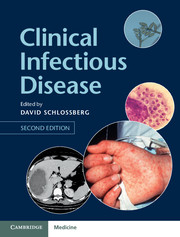Book contents
- Frontmatter
- Dedication
- Contents
- List of Contributors
- Preface
- Part I Clinical syndromes: general
- Part II Clinical syndromes: head and neck
- Part III Clinical syndromes: eye
- Part IV Clinical syndromes: skin and lymph nodes
- Part V Clinical syndromes: respiratory tract
- Part VI Clinical syndromes: heart and blood vessels
- Part VII Clinical syndromes: gastrointestinal tract, liver, and abdomen
- Part VIII Clinical syndromes: genitourinary tract
- Part IX Clinical syndromes: musculoskeletal system
- Part X Clinical syndromes: neurologic system
- Part XI The susceptible host
- Part XII HIV
- Part XIII Nosocomial infection
- Part XIV Infections related to surgery and trauma
- Part XV Prevention of infection
- Part XVI Travel and recreation
- Part XVII Bioterrorism
- Part XVIII Specific organisms: bacteria
- Part XIX Specific organisms: spirochetes
- Part XX Specific organisms: Mycoplasma and Chlamydia
- 167 Mycoplasma
- 168 Chlamydia pneumoniae
- 169 Chlamydia psittaci (psittacosis)
- Part XXI Specific organisms: Rickettsia, Ehrlichia, and Anaplasma
- Part XXII Specific organisms: fungi
- Part XXIII Specific organisms: viruses
- Part XXIV Specific organisms: parasites
- Part XXV Antimicrobial therapy: general considerations
- Index
- References
167 - Mycoplasma
from Part XX - Specific organisms: Mycoplasma and Chlamydia
Published online by Cambridge University Press: 05 April 2015
- Frontmatter
- Dedication
- Contents
- List of Contributors
- Preface
- Part I Clinical syndromes: general
- Part II Clinical syndromes: head and neck
- Part III Clinical syndromes: eye
- Part IV Clinical syndromes: skin and lymph nodes
- Part V Clinical syndromes: respiratory tract
- Part VI Clinical syndromes: heart and blood vessels
- Part VII Clinical syndromes: gastrointestinal tract, liver, and abdomen
- Part VIII Clinical syndromes: genitourinary tract
- Part IX Clinical syndromes: musculoskeletal system
- Part X Clinical syndromes: neurologic system
- Part XI The susceptible host
- Part XII HIV
- Part XIII Nosocomial infection
- Part XIV Infections related to surgery and trauma
- Part XV Prevention of infection
- Part XVI Travel and recreation
- Part XVII Bioterrorism
- Part XVIII Specific organisms: bacteria
- Part XIX Specific organisms: spirochetes
- Part XX Specific organisms: Mycoplasma and Chlamydia
- 167 Mycoplasma
- 168 Chlamydia pneumoniae
- 169 Chlamydia psittaci (psittacosis)
- Part XXI Specific organisms: Rickettsia, Ehrlichia, and Anaplasma
- Part XXII Specific organisms: fungi
- Part XXIII Specific organisms: viruses
- Part XXIV Specific organisms: parasites
- Part XXV Antimicrobial therapy: general considerations
- Index
- References
Summary
Mycoplasmas are the smallest free-living organisms and are unique among prokaryotes in that they lack a cell wall, a feature that is largely responsible for their biologic properties and lack of susceptibility to many commonly prescribed antimicrobial agents. Mycoplasmas are usually mucosally associated, residing primarily in the respiratory and urogenital tracts and rarely penetrating the submucosa, except in the case of immunosuppression or instrumentation, when they may invade the bloodstream and disseminate to many different organs and tissues throughout the body. Intracellular localization occurs in some species and may contribute to chronicity that characterizes many mycoplasmal infections.
There are at least 17 species of mycoplasmas and ureaplasmas for which humans are believed to be the primary host, and numerous others of animal origin that have been detected occasionally, most often in the setting of immunosuppression. Several human mycoplasmal species are commensals in the upper respiratory or lower urogenital tracts. Five species are responsible for the majority of clinically significant infections which may come to the attention of the practicing physician. These species are Mycoplasma pneumoniae, Mycoplasma hominis, Mycoplasma genitalium, Ureaplasma urealyticum, and Ureaplasma parvum. Mycoplasma fermentans is another mycoplasma of human origin that may behave as an opportunist. M. fermentans has been detected in throat cultures of children with pneumonia, in some cases when no other etiologic agent was identified, but the frequency of its occurrence in healthy children is not known. This mycoplasma has also been detected in adults with an acute influenza-like illness and in bronchoalveolar lavage specimens from patients with the acquired immunodeficiency syndrome and pneumonia. Mycoplasma amphoriforme is the newest human mycoplasma to be described. It has been detected in a small number of patients with recurrent bronchitis, but its true role as a human pathogen has not yet been established. Other mycoplasmas of animal origin occasionally cause zoonotic infections.
- Type
- Chapter
- Information
- Clinical Infectious Disease , pp. 1076 - 1085Publisher: Cambridge University PressPrint publication year: 2015



